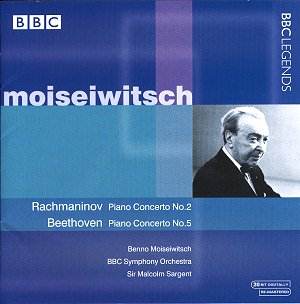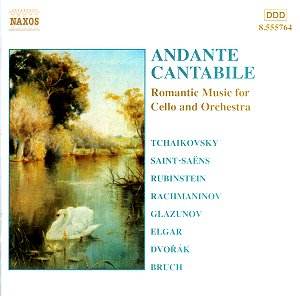 Composer: Ludwig van Beethoven
Composer: Ludwig van Beethoven
Works: Piano Concerto No. 5 in E flat, Op. 73, ‘Emperor’; Piano Concerto No. 2 in C minor, Op. 18
Performers: Benno Moiseiwitsch (piano), BBC Symphony Orchestra, Sir Malcolm Sargent (conductor)
Recording: Royal Festival Hall, March 6th, 1963 (Beethoven); Royal Albert Hall, August 6th, 1956 (Rachmaninov)
Label: BBC LEGENDS/IMG ARTISTS BBCL4074-2
The ‘Emperor’ Concerto, Beethoven’s final piano concerto, represents a pinnacle in the evolution of the genre, merging classical poise with the burgeoning Romantic spirit that characterized its time. Composed during the years of the Napoleonic Wars, the work embodies a struggle between tumult and triumph, with its expansive themes and dramatic contrasts. In contrast, Rachmaninov’s Second Piano Concerto emerged from the composer’s personal turmoil following his exile and represents a lush, lyrical response to the emotional challenges of the early 20th century. Together, these works, interpreted by the venerable Benno Moiseiwitsch under the baton of Sir Malcolm Sargent, present a fascinating juxtaposition of musical ideals across two centuries.
Moiseiwitsch’s performance of the ‘Emperor’ is a masterclass in interpretative depth and technical prowess. The explosive opening chords resonate with a fierce exuberance that sets a grandiose tone, the dry strokes of the timpani providing a stark backdrop against which the piano flourishes. The richness of the piano sound is particularly noteworthy, creating a sonic tapestry that is both full-bodied and nuanced. While some might point to minor blemishes in the cadenzas, these do little to detract from the overall impact; rather, they underscore the pianist’s willingness to embrace risk in service of a grander vision. The dynamic range he navigates is astonishing, especially in the final movement, where the orchestral and pianistic forces ebb and flow from thunderous fortissimo to whispering pppp, capturing the essence of Beethoven’s dramatic narrative.
Transitioning to Rachmaninov, one notes Moiseiwitsch’s affinity for the composer, which infuses his interpretation with vitality and emotional depth. The opening of the Second Concerto is marked by a visceral drama, the piano’s entry almost volcanic in its intensity, complemented by the lush strings that follow. Moiseiwitsch’s sensitivity to the subtleties of harmonic shifts in the second movement reveals an astute understanding of the composer’s intent, transforming the inner workings of the music into a vivid emotional landscape. His long-range vision in the final movement is particularly commendable; instead of a hurried sprint to the finish line, he allows the music to unfold organically, culminating in a powerful resolution that feels both inevitable and satisfying.
The engineering quality of this recording enhances the listener’s experience, with a clarity that allows the listener to appreciate the intricate interplay between piano and orchestra. The sound is well-balanced, with the piano’s rich tones beautifully captured against the orchestral backdrop, a testament to the technical prowess of the recording team at the BBC. When compared to other notable recordings, such as that of Solomon with the Philharmonia Orchestra, Moiseiwitsch’s interpretations stand out for their emotional resonance and technical mastery, presenting a compelling case for his place amongst the greats.
Benno Moiseiwitsch’s performances of Beethoven and Rachmaninov are not just interpretations; they are vibrant conversations with the music itself. His ability to marry phenomenal technique with profound musicality serves as a reminder of a bygone era when such artistry was more commonplace. This recording is an essential listen, revitalizing the legacy of a pianist whose artistry remains unmatched in its depth and expressiveness.



